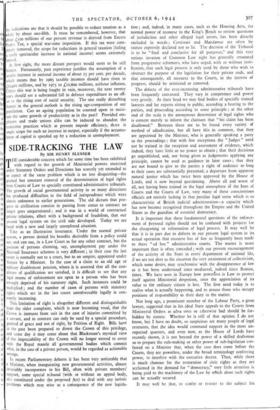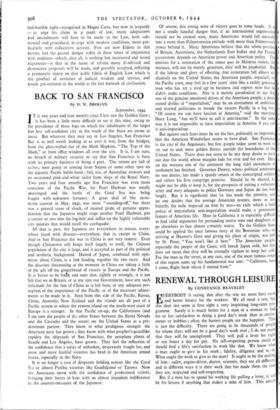SIDE-TRACKING THE LAW
By SIR HENRY SLESSER
rp HE considerable concern which for some time has been exhibited I with regard to the growth of Ministerial powers exercised under Statutory Orders and Directions has scarcely yet extended to an aspect of the same problem which is no less disquieting—the gradual but constant removal of the determination of legal rights from Courts of Law to specially constituted administrative tribunals. The growth of social governmental activity in so many directions has produced difficulties in the field of jurisprudence which were almost unknown to earlier generations. The old dictum that pro- gress in civilisation consists in passing from status to contract no longer goes unquestioned ; and it was in a world of contractual private relations, albeit with a background of feudalism, that our present legal. system on the civil side developed. Today we are faced with a new and largely unexplored situation.
Take as an illustration insurance. Under the normal private system, a person denied his benefits derivable from a policy could sue, and can sue, in a Law Court as for any other contract, but the position of persons claiming, say, unemployment pay under the National Insurance schemes is very different ; in their case the last resort is normally not to a court, but to an umpire, appointed under Statute by a Minister. In the case of a claim to an old age or military disablement pension, where it is asserted that all the con- ditions of qualification are satisfied, it is difficult to see that any legal means of enforcement are open to a person who has been wrongly deprived of his statutory right. Such instances could be multiplied ; and the number of cases of persons with statutory rights which are in the last resort unenforceable legally is con- stantly increasing.
This limitation of right is altogether different and distinguishable from the older complaint, which is now becoming vocal, that the Crown is immune from suit in the case of injuries committed by a servant, and in contrast can only be sued by a special procedure, granted of grace and not of right, by Petition of Right. Bills have in the past been prepared to divest the Crown of this privilege, and some day it may come about that Bladtstone's mystical view Of the impeccability of the Crown will no longer extend to cover With the Royal mantle all - governmental bodies which commit what, in the case of a private person, would be regarded as actionable wrongs.
In recent Parliamentary, debates it has been very noticeable that a Minister, when inaugurating new governmental activities, almost invariably incorporates in his Bill, often with private members' support, some special tribunal (with or without an appeal body, also constituted under the proposed Act) to deal with any juristic Problems which may arise as a consequence of the new legisla- tion ; and, indeed, in many cases, such as the Housing Acts, the normal power of recourse to the King's Bench to review questions of jurisdiction and other alleged legal errors, has been directly excluded in words ; Certiorari and Mandamus are often by statute expressly declared not to lie. The decision of the Tribunal is to be "final and conclusive for all purposes," and this very serious invasion of Common Law right has generally emanated from progressive reformers, who have urged, with or without justi- fication, that such legal process is only used by those who wish to obstruct the purpose of the legislation for their private ends, and that consequently, all recourse to the Courts, in the interest of progress, should be restricted or removed.
The defects of the ever-increasing administrative tribunals have been frequently canvassed. They vary in competence and power very greatly. At their head we may find bodies of specially trained lawyers and lay experts sitting in public, according a hearing to the parties, and proceeding according to some principle ; at the other end of the scale is the anonymous determiner of legal rights who is content merely to inform the claimant that "his claim has been disallowed." Between these are to be found every variety of method of adjudication, but all have this in common, that they are appointed by the Minister, who is generally speaking a party to the proceedings ; that with few exceptions the " judges " need not be trained in the reception and assessment of evidence, which indeed, they have little or no power to obtain ; that their decisions go unpublished, and, not being given as judgements applying any principle, cannot be used as guidance in later cases ; that they are not bound to give to the parties a right of audience so long as their cases are substantially presented, a departure from apparent natural justice which has twice been approved by the House of Lords, and is now beyond questioning. Above all and worst of all, not having been trained in the legal atmosphere of the Inns of Courts and the Courts of Law, very many of these conscientious officials art entirely lacking in that peculiar legal sense which is so characteristic of British judicial administration—a capacity which has now become recognised throughout the Empire and the United States as the guardian of essential democracy.
It is important that these fundamental questions of the enforce- ment of personal rights should not be confused with projects for the cheapening or reformation of legal process. It may well be that it is in part due to defects in our present legal system in its actual operation that recourse has of late so frequently been made to these "ad hoc" administrative courts. The matter is more important than is often conceded ; with our present encouragement of the activity of the State in every department of national life, if we are not alert to the situation the very attainment of collectivism, which some desire, may synchronise with the disappearance of law as it has been understood since mediaeval, indeed since Roman, times. We have seen in Europe how powerless is Law to protect itself against Ministerial despotism, once the appreciation of its value to tht ordinary citizen is lost. The first need today is to realise what is actually happening, and to arouse those who occupy positions of responsibility to their duty in the matter.
Not long ago, a prominent member of the Labour Party, a great lawyer, suggested that in his ideal State appeals to the Courts from Ministerial Orders as ultra vires or ctherwise bad should be for- bidden by statute. Whether he is still of that opinion I do not know, but I have no doubt, so suspicious are many people of legal restraints, that the idea would command support in the most un- expected quarters, and even now, as the House of Lords have recently shown, it is not beyond the power of a skilled draftsman so to prepare the rule-making or other power of sub-legislation con- ferred on a Minister that, when the case does come before the Courts, they are powerless, tinder the broad terminology conferring power, to interfere with the executive decree. Thus, while there is much clamour for the restoration of civic rights as they are acclaimed in the demand for "democracy," very little attention is being paid to the machinery of the Law by which alone such rights can be actually secured.
It may well be that, to confer or restore to the subject his indefeasible right—recognised in Magna Carta, but now in jeopardy — to urge his claim in a court of law, many adaptations and amendments will have to be made in the Law, both sub- stantial and procedural, to cope with modern conditions, more par- ticularly with collectivist activity. Few are now Eldons in this matter, but the greater danger today in these times of impatience with tradition—which, after all, is nothing but incarnated and tested experience—is that in the name of reform many ill-advised and destructive proposals will be made, and possibly accepted, inflicting a permanent injury on that noble fabric of English Law which is the product of centuries of judicial wisdom and service, and stands pre-eminent in the world as the last bulwark of civilisation.



























 Previous page
Previous page